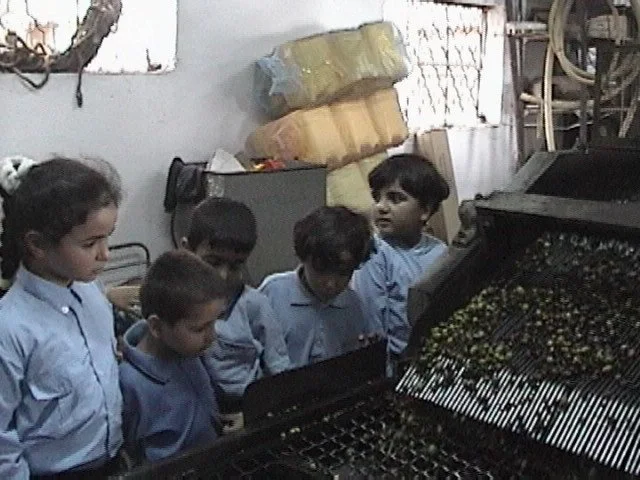October 19, 2002
Now it's both of us who are nursing colds. Elizabeth called in sick at school and stayed in bed as much as possible, between cups of tea and broth.
The children watch the olives being sorted.
A sampling of the olive oil that comes out the other side.
Marthame left home briefly to forage for important supplies - tissues, juice, and bread - and also to accompany the nursery students on their field trip to the olive press. We had visited several of them two years ago, but this was the first time either of us has been to one here in town. The olives are brought in large bags, then dumped into the system which sorts the olives out from the sticks and leaves, then they are washed, crushed, then the water and oil are separated out. The end result is glorious, glorious fresh olive oil. As in previous years, chances are that people will generously give us some of their oil and olives - something we're unlikely to turn down. The olive waste, meantime, is dumped into tractors outside which are the responsibility of those who bring the olives to deal with. Most simply dump it along the side of the road, which has damaging effects on the land and watershed. Some people use the "olive cake" as fuel, as we've seen at the local bakery. As yet, there is no infrastructure or system to deal properly with olive cake, or with solid waste generally here. In homes, trash is collected and taken out carefully tied up in plastic bags (which are ubiquitous) and deposited in neat dumpsters. Then a truck picks up the trash and it gets added to a big pile outside of town, often in a ravine or stream bed. The piles then occasionally get burned. No lining for these makeshift landfills, no way to control contents of what will be released into the waterways and land. It wouldn't be so bad if modern consumer goods and materials weren't here. But as it is, plastics and batteries and aerosol cans are treated as if they can be disposed of like cucumber peels and cow dung.
These problems have solutions, and when a Palestinian state seemed to be on the horizon, they could be imagined. But now greater threats occupy people's minds.


